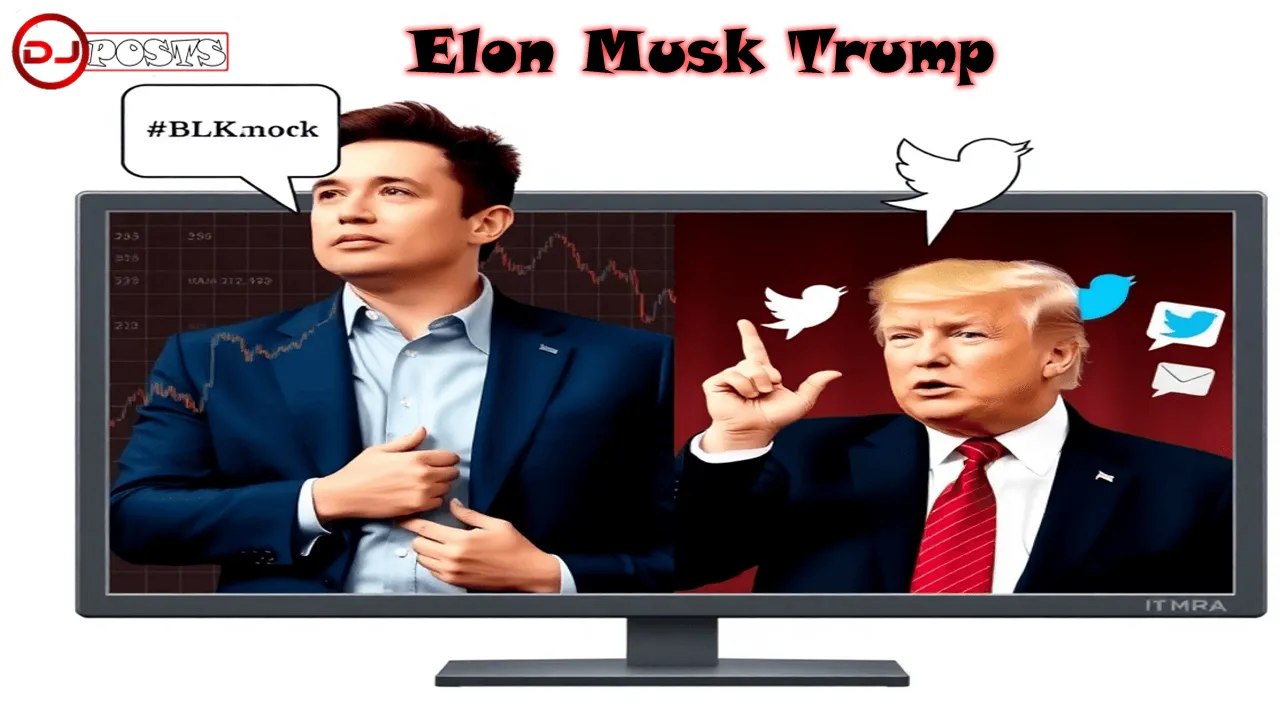The relationship between Elon Musk and Donald Trump has become one of the most closely watched dynamics in modern American politics and business. Their interactions send ripples through financial markets, shape public discourse, and influence millions of followers across social media platforms.
Effects on Wall Street
When these two influential figures engage in public discussions or disagreements, the effects extend far beyond their personal relationship. Wall Street traders monitor their exchanges with keen interest, knowing that a single tweet or public statement can trigger significant market movements. Tesla’s stock price has historically shown sensitivity to political developments involving Musk, while Trump’s endorsements or criticisms of business leaders often create immediate market reactions.
Effects on Public Opinion Elon Musk Trump

The public opinion landscape shifts dramatically when Musk and Trump align or clash on key issues. Their combined social media reach exceeds 200 million followers, making their conversations powerful catalysts for public sentiment. Recent discussions between them have covered topics ranging from:
- Free speech policies on social media platforms
- Government regulation of technology companies
- Immigration and citizenship policies
- Economic policies affecting American businesses
The Elon Musk Trump dynamic represents more than celebrity politics—it embodies the intersection of technological innovation, political power, and economic influence. Their relationship continues to shape conversations about the future of American business and democracy, making every interaction a potential turning point for markets and public discourse.
Introduction
The relationship between Elon Musk and Donald Trump has become increasingly complex, reflecting the volatile intersection of technology, politics, and public discourse. What started as occasional disagreements has now escalated into a full-blown social media feud that impacts financial markets, political circles, and public perception.
Musk’s growing criticism of Elon Musk Trumpgoes beyond personal dislike between two prominent figures. The Tesla CEO’s public remarks have far-reaching consequences, affecting stock prices, political campaign strategies, and even shaping American discourse on issues like immigration, technology regulation, and environmental policies.
Both Wall Street analysts and political strategists are closely watching this transformation of the billionaire entrepreneur from an apolitical businessman to an outspoken critic. His vast social media following amplifies every comment, turning personal opinions into significant events and controversies that grab headlines.
This unique situation has created a scenario where one person’s tweets can simultaneously impact:
- Tesla’s stock performance
- Political polling data
- Public perception of both individuals
- Media coverage patterns
These implications go beyond mere entertainment value. They raise important questions about the role of tech leaders in shaping political narratives and the responsibility that comes with such influence.
Background of the Elon Musk and Elon Musk Trump
The relationship between Elon Musk and Donald Trump has evolved into one of the most watched social media feuds in recent political history. Their public exchanges began gaining significant attention during the Trump administration, when Musk served on presidential advisory councils before dramatically resigning in 2017 over climate policy disagreements.
Elon Musk criticism of Trump intensified through various Twitter exchanges, where both figures leveraged their massive social media followings to amplify their disagreements. The Tesla CEO frequently challenged Trump’s policies on:
- Climate change initiatives
- Immigration reform
- Technology regulation
- Space exploration funding Elon Musk Trump
Trump responded with characteristic directness, questioning Musk’s business practices and calling him “another fake entrepreneur.” The feud reached new heights when Musk publicly endorsed Ron DeSantis during the 2024 Republican primary, directly opposing Trump’s candidacy.
Their social media feud became particularly volatile around discussions of government contracts, with Trump suggesting Musk’s companies received unfair advantages through federal subsidies. Musk countered by highlighting his companies’ contributions to American manufacturing and space exploration.
The dynamic shifted dramatically when recent political developments brought both figures back into the spotlight, with their past disagreements serving as context for current controversies involving classified documents and political influence campaigns.
The Jeffrey Epstein Files Elon Musk Trump

The Jeffrey Epstein files became a point of contention in recent exchanges between Elon Musk and Donald Trump, adding another layer of complexity to their already strained relationship. When discussions about the Trump Epstein files controversy surfaced on social media platforms, particularly X (formerly Twitter), the conversation quickly escalated beyond typical political discourse.
Key Issues at Stake
Musk’s platform became the battleground where questions about transparency and accountability took center stage. The tech mogul’s calls for releasing certain documents sparked heated debates about what the public deserves to know versus privacy concerns. FAA flight logs emerged as a particularly contentious topic, with various parties demanding access to records that could shed light on high-profile connections.
Government Response and Challenges
The DOJ found itself caught between competing demands for transparency and ongoing legal considerations. Public pressure mounted as social media users, including Musk himself, questioned why certain files remained sealed or redacted. This controversy highlighted the intersection of:
- Social media influence on public discourse
- Government transparency expectations
- Celebrity accountability in the digital age
- Legal system limitations regarding sealed documents
Communication Clash: Elon Musk Trump
The Elon Musk Trump dynamic intensified as both figures used their respective platforms to address the controversy. Musk’s approach of direct questioning through X posts contrasted sharply with Trump’s more traditional media responses, creating a modern clash of communication styles that captivated public attention and influenced market sentiment.
Political Repercussions and Citizenship Controversy Elon Musk Trump
The heated exchanges between Musk and Trump have sparked serious discussions about denaturalization plans and their potential implementation. Trump’s previous administration policies regarding immigration enforcement have resurfaced in political discourse, with renewed focus on how such measures might affect high-profile naturalized citizens.
Musk’s South African birth and subsequent American citizenship have become focal points in these debates. Critics have raised questions about whether his political influence and business dealings could make him a target under stricter Elon Musk Trumpthat have been floated by various political figures. The tech mogul’s vocal opposition to certain policies has intensified these discussions.
Key political implications include:
- Renewed scrutiny of naturalized citizens’ political activities
- Questions about selective enforcement of immigration laws
- Debates over the relationship between wealth, influence, and citizenship security
The controversy has highlighted potential vulnerabilities in the citizenship status of even the most prominent Americans. Legal experts have weighed in on whether Trump administration policies from the previous term could be expanded to target individuals based on their political statements or business activities.
“The intersection of politics and citizenship has never been more complex,” noted one constitutional law professor, referring to how these high-profile disputes might influence future policy decisions.
The business community has watched these developments with particular interest, given Musk’s significant role in multiple industries and his companies’ government contracts.
Impact on Wall Street and Business Communities Elon Musk Trump
The heated exchanges between Elon Musk and Donald Trump have sent ripples through financial markets, creating an atmosphere of uncertainty that traders and investors are closely monitoring. Wall Street reaction has been particularly pronounced when these public disputes coincide with major policy announcements or regulatory discussions affecting the tech sector.
Effects on Tesla’s Stock Price
Tesla’s stock price has experienced notable fluctuations during periods of intense political discourse between the two figures. When Musk’s political statements align with or contradict Trump’s positions, institutional investors often reassess their positions in Tesla and other Musk-affiliated companies. The market volatility from political discourse becomes especially evident during earnings seasons when analysts factor in potential regulatory risks stemming from political tensions.
Broader Implications for the Tech Industry
Tech industry influence extends beyond individual stock movements. The broader technology sector faces scrutiny when high-profile leaders like Musk engage in political controversies. Investment firms have begun incorporating “political risk assessments” into their evaluation models for tech stocks, recognizing that executive behavior can significantly impact market performance.
Concerns within Business Communities Elon Musk Trump
Business communities have expressed concerns about the unpredictability factor. Corporate leaders worry that:
- Political feuds could influence regulatory decisions
- Consumer sentiment might shift based on public perception
- International business relationships could be affected
- Talent acquisition and retention might become challenging
The financial sector’s response demonstrates how modern markets react not just to economic fundamentals, but to the political positioning of influential business leaders.
Public Opinion and Media Coverage Elon Musk Trump
The public opinion on Musk-Trump feud has created a fascinating divide across traditional political lines. Social media platforms have become battlegrounds where supporters and critics clash over every exchange between the two figures. Twitter polls consistently show split reactions, with some users praising Musk’s willingness to challenge Trump while others view it as betrayal of conservative values.
MAGA influencers reaction has been particularly intense and polarized. High-profile Trump supporters like Charlie Kirk and Candace Owens have found themselves in awkward positions, trying to balance their support for both figures. Some have chosen sides explicitly, while others attempt diplomatic neutrality that satisfies neither camp.
ABC News coverage and other mainstream outlets have amplified every tweet, comment, and subtle dig between the two personalities. The media’s approach has been to frame each interaction as a potential political earthquake, often magnifying minor disagreements into major rifts. Cable news segments dedicate entire blocks to analyzing the implications of a single social media post.
The coverage pattern reveals how modern political discourse operates in real-time cycles. News organizations compete to break down each Elon Musk Trump interaction within hours, creating a feedback loop that influences both public perception and the principals themselves. This rapid-fire analysis has transformed what might have been private disagreements into public spectacles that shape voter attitudes and market sentiment.
Conspiracy Theories Surrounding Elon Musk Trump
The Epstein client list conspiracy theories have gained unprecedented momentum following Musk’s public statements about Trump and the controversial files. Social media platforms are buzzing with speculation about what the complete documentation might reveal, creating a perfect storm of misinformation and legitimate concerns.
The Role of Epstein Files in Online Conspiracy Narratives
Phase 1 and Phase 2 Epstein files have become central to numerous conspiracy narratives circulating online. These theories suggest:
- Hidden connections between political figures and Epstein’s network
- Deliberate suppression of certain names from public disclosure
- Strategic timing of file releases to influence political outcomes
- Cover-ups involving high-profile business leaders and celebrities
The Amplification of Conspiracy Theories on Social Media
The digital echo chambers amplify these theories at lightning speed. Musk’s platform X (formerly Twitter) serves as a primary battleground where conspiracy theorists dissect every redacted line and missing page. His cryptic posts aboutElon Musk Trump and “truth” fuel speculation about what information remains classified.
Algorithmic amplification plays a crucial role in spreading these theories. The platform’s recommendation systems often promote sensational content, creating feedback loops that reinforce conspiratorial thinking. Users share fragmented information, connecting dots that may not actually exist.
The Intersection of Musk’s Elon Musk Trump Political Ambitions
The intersection of Musk’s influence and Trump’s political ambitions creates fertile ground for conspiracy theories to flourish. Each public exchange between them generates new waves of speculation about hidden agendas and secret knowledge.
Analysis of Political Discourse Using Technology Elon Musk Trump

The clash between Elon Musk and Trump has fundamentally altered how political conversations unfold in the digital age. Social media platforms, particularly X (formerly Twitter), have become battlegrounds where political discourse AI tools shape public perception and amplify controversial statements.
The Rise of AI-Powered Political Commentary Elon Musk Trump
Musk’s Grok chatbot’s role in politics represents a significant shift in how artificial intelligence influences political narratives. Unlike traditional chatbots designed to remain neutral, Grok deliberately adopts a provocative stance, often echoing its creator’s political viewpoints. This development raises critical questions about AI bias in political discussions.
The chatbot’s responses to queries about Trump, political controversies, and current events demonstrate how technology can be programmed to reflect specific ideological perspectives. Elon Musk Trump When users ask Grok about political figures or events, its responses often mirror Musk’s own public statements and positions.
Digital Echo Chambers and Amplification
The effects of political polarization caused by this technological approach extend far beyond simple disagreements. AI tools now actively participate in creating and reinforcing echo chambers:
- Algorithmic bias: shapes what content users see
- Automated responses: can spread misinformation faster than fact-checkers can respond
- Personalized feeds: create separate realities for different user groups
Technology as a Political Weapon
The Musk-Trump dynamic illustrates how tech leaders can weaponize their platforms for political purposes. X’s algorithm changes, content moderation policies, and feature implementations directly impact political discourse. When Musk reinstated previously banned accounts or modified trending topics, these decisions influenced millions of users’ political exposure.
Long-Term Effects on Politics and Society
The future implications of the Elon Musk-Trump feud extend beyond their personal disagreements. This technological approach to political discourse sets dangerous precedents:
- Democratic institutions face new challenges when AI systems can generate convincing political content at scale.
- Public trust in information sources continues to erode as people struggle to distinguish between human opinions and AI-generated responses.
The normalization of using technology platforms as political weapons threatens the foundation of informed democratic participation. Citizens increasingly receive their political information through algorithms designed to maximize engagement rather than accuracy, creating a society where political polarization effects become self-reinforcing through technological means.
FAQs (Frequently Asked Questions Elon Musk Trump)
What triggered the feud between Elon Musk Trump?
The feud between Elon Musk and Donald Trump was primarily sparked by Musk’s public criticism of the Trump administration, which escalated through a series of social media exchanges highlighting their political differences.
How did the Jeffrey Epstein files controversy involve Elon Musk Trump?
The Jeffrey Epstein files controversy brought attention to alleged connections involving high-profile individuals, including Donald Trump. Discussions around the DOJ investigations, FAA flight logs, and conspiracy theories have occasionally referenced both Trump and Musk in the broader political discourse.
What are the political repercussions related to citizenship controversies during the Trump administration Elon Musk Trump?
During the Trump administration, there were plans for denaturalization and deportation threats that stirred significant political debate. These policies influenced public opinion and were part of broader discussions about immigration and citizenship rights.
How has the Elon Musk-Donald Trump feud impacted Wall Street and business communities?
The public feud between Elon Musk and Donald Trump has contributed to market volatility, influencing investor sentiment on Wall Street. The tech industry’s response to political discourse has also shaped business community perspectives and investment strategies.
What role does media coverage play in shaping public opinion about the Musk-Elon Musk Trump?
Media outlets like ABC News have extensively covered the Musk-Trump feud, influencing public opinion by highlighting reactions from MAGA influencers and other stakeholders. This coverage affects how different demographics perceive the ongoing political discourse.


